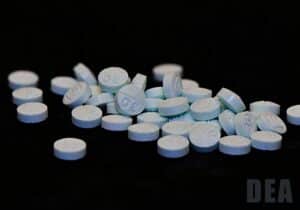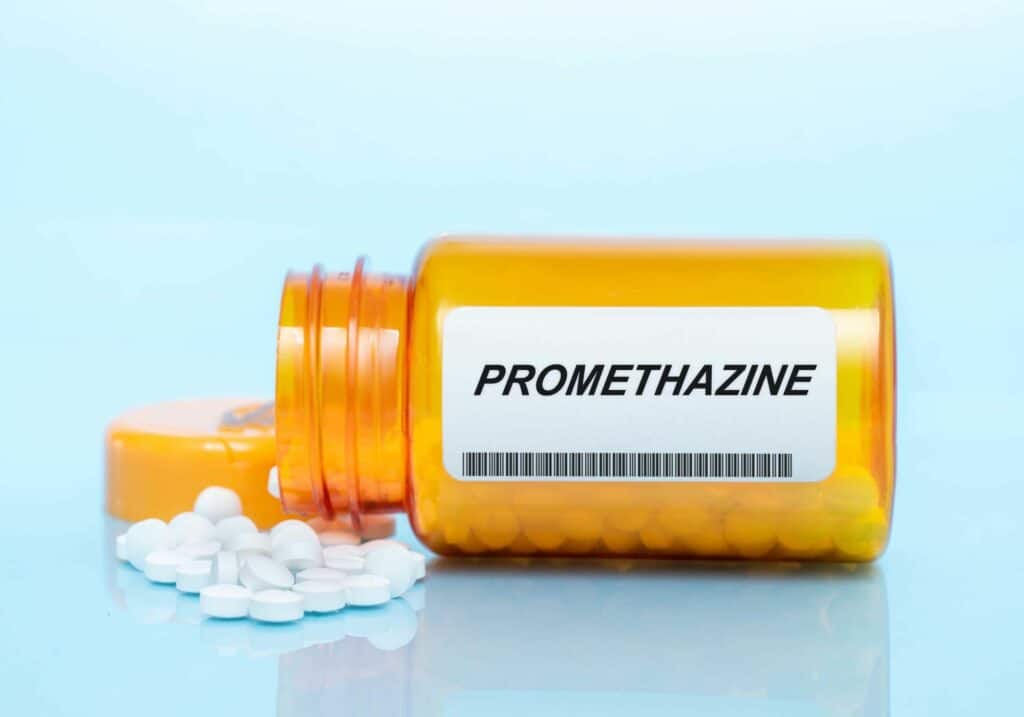Promethazine, commonly known under the brand name Phenergan, is a medication rooted in the phenothiazine compound, designed to combat allergies and motion sickness. However, it has increasingly found its way into the hands of individuals struggling with opioid addiction, who misuse it for its potent effects, especially when mixed with substances like codeine or alcohol. This article delves deep into the world of promethazine, highlighting its potential for misuse, the associated risks, and the critical side effects that everyone should be aware of.
Understanding the dangers of promethazine abuse is crucial, as its misuse can lead to severe health complications and dependency issues. Whether you’re confronting this challenge yourself or watching a loved one struggle, it’s vital to grasp the full spectrum of this issue.
If you or someone close to you is battling with a promethazine addiction, remember, knowledge is the first step towards recovery. By familiarizing yourself with the risks and knowing when to seek help, you’re laying down the foundation for a successful recovery journey. Let this article serve as your guide, offering insights and assistance in overcoming the hurdles of promethazine addiction.
What is Promethazine?
Promethazine, a medication that came into existence in the 1940s thanks to the pioneering efforts of scientists at the French chemical firm Rhône-Poulenc, is the outcome of combining phenothiazine with a diamine side chain similar to diphenhydramine. This innovative blend led to the creation of promethazine, a synthetic drug that falls under the broader category of phenothiazines, known for their effectiveness in treating various medical conditions.
In recent years, promethazine has found its way into the spotlight for reasons beyond its medical uses. It has become notorious as a substance often misused, especially highlighted in rap music and through social media platforms, where it’s referenced as a key component in concoctions like “purple drank,” “sizzurp,” or “lean.” This growing trend underscores the importance of understanding both the legitimate uses and potential misuse of promethazine.
How Promethazine Works
Promethazine functions as a shield against histamine, a natural substance that your body releases during allergic reactions. By blocking histamine, it can alleviate symptoms like itching, sneezing, and hives. Beyond its role in managing allergies, promethazine has a calming effect on the brain’s vomiting center, helping to prevent nausea and vomiting.
When it comes to combining promethazine with other medications, its flexibility shines. Healthcare providers often incorporate it into combination therapies for its ability to enhance the effects of other drugs. For instance, when paired with opioids like Meperidine, promethazine can boost pain relief. However, combining it with drugs like Phenobarbital, a barbiturate, might lead to increased drowsiness.
Promethazine is sought after for its efficacy in treating various conditions, including:
- Allergic reactions such as watery eyes, skin redness, and rashes
- Motion sickness
- Symptoms of the common cold, like sneezing, cough, and runny nose
- Nausea and vomiting
- Pre-surgical anxiety
- Post-surgical pain
- Insomnia
While promethazine is effective in managing these symptoms, it’s important to remember that it doesn’t cure the underlying conditions or expedite recovery. For insights on how promethazine might interact with other medications you’re taking, reaching out to a healthcare professional is always the best course of action.
Is Promethazine Addictive?
Promethazine, while mainly an antihistamine used to treat conditions such as allergies and motion sickness, does not typically carry a high risk of addiction due to its sedative properties. However, with long-term use, there is a potential for developing physical dependence on this medication.
The likelihood of developing a dependency on promethazine is lower compared to drugs with more potent psychoactive effects. Recreational use of promethazine is not common, as it is prescribed mainly for its intended medical uses, including alleviating nausea and providing sedation.
The Dangers of Promethazine Abuse
Promethazine abuse can lead to a range of harmful effects, both physical and psychological. Here’s what you need to be aware of:
- Severe Nausea and Vomiting: High doses of promethazine often result in serious gastrointestinal problems.
- Impaired Coordination: As a central nervous system depressant, promethazine significantly reduces mental alertness and slows down reaction times. Regular misuse may lead to lasting coordination issues, causing dizziness and difficulties in maintaining balance.
- Memory Issues: Temporary memory loss or “blackouts” can occur with the abuse of promethazine-codeine cough syrup. Over time, this can evolve into long-term memory problems.
- Hallucinations: High doses may cause visual and auditory hallucinations, potentially leading to paranoia and panic attacks.
- Cardiovascular Risks: Promethazine impacts the cardiovascular system, potentially causing abnormal heart rhythms and blood pressure changes.
- Seizures: At high doses, especially when involving promethazine-codeine cough syrup, seizures are a risk and can also emerge as a withdrawal symptom.
- Risk of Fatal Overdose: Overdosing on promethazine, particularly when combined with codeine, is extremely dangerous. Both substances depress the central nervous system, which can lead to respiratory failure and potentially fatal outcomes.
These are just a few of the serious risks associated with the misuse of promethazine. If you or someone you know is struggling with promethazine addiction, reaching out for professional assistance from a trusted treatment facility is crucial. Taking that step can be life-saving and pivotal in the journey towards recovery.
Promethazine Side Effects
Promethazine, while beneficial for certain medical conditions, carries potential side effects that users should be aware of. Common side effects to this medication may include:
- Feeling unusually tired or sleepy.
- Vision becoming less clear or blurred.
- A sense of calm or sedation that might be more intense than expected.
- Experiencing confusion or having trouble thinking clearly.
- Feeling light-headed or dizzy.
However, there are less common, yet more severe side effects associated with promethazine that require immediate attention:
- Difficulty in breathing or shallow breaths, known as respiratory depression.
- Unexpected seizures.
- Experiencing hallucinations, seeing or hearing things that aren’t there.
- An irregular heartbeat, either too fast or too slow.
- The appearance of yellowing in the skin or eyes, indicating potential liver issues.
- Developing a fever without a clear cause.
- Experiencing unusually stiff muscles.
It’s crucial for individuals taking promethazine or their loved ones to monitor for these effects. If any of the more serious symptoms appear, seeking medical attention promptly is essential. Being informed about these possible reactions helps in managing the use of promethazine safely.
Signs and Symptoms of Promethazine Abuse
Understanding the signs of promethazine abuse is crucial, whether for oneself or someone dear. Misuse of this medication, especially in the form of promethazine-codeine cough syrup, often called “purple drank,” presents specific behaviors and symptoms.
Signs of promethazine addiction to be aware of include:
- Discovery of empty cough syrup bottles hidden away or discarded carelessly.
- The presence of items commonly associated with “sizzurp” concoctions, such as soda and candy.
- Sudden mood changes, ranging from irritability to aggression.
- Noticeable shifts in mood or emotional state.
- A dwindling interest in hobbies or activities once found enjoyable.
- Changes in friendships or the people one spends time with.
- Altered sleep patterns, either too much or too little sleep.
- Neglecting personal grooming or hygiene.
- Withdrawing from family interactions and avoiding close friends.
- Consistent drowsiness or a noticeable struggle to stay awake.
- Difficulty with physical coordination or seeming unsteady.
- Frequent, perhaps secretive, searches for cough syrup in medicine cabinets.
- Experiencing withdrawal symptoms, such as agitation or physical discomfort, when promethazine is unavailable.
Recognizing these signs is a vital step toward seeking help. If you or someone you know is displaying these symptoms, it’s important to approach the situation with compassion and consider reaching out for professional guidance and support.
Mixing Promethazine With Other Substances
When promethazine is mixed with codeine, alcohol, or other addictive substances, the risks of abuse and dependency significantly increase. There was a time when a cough and cold medicine that combined promethazine with codeine was legally available by prescription in the United States.
However, due to the escalating concerns over abuse, this particular formulation was phased out. Despite its discontinuation, the combination of promethazine and codeine continues to circulate in illegal markets, often sought after for illicit use.
Codeine, a prescription opioid, is effective for suppressing coughs and managing pain but carries a high risk for abuse, addiction, and potentially fatal overdose. It is classified as a controlled substance by federal law due to its potential for abuse.
Both codeine and promethazine have sedative properties and can lead to respiratory depression, a serious condition where breathing becomes dangerously slow or stops altogether. Combining promethazine with codeine, alcohol, or benzodiazepines like Xanax increases these risks exponentially, presenting a lethal danger even in small amounts.
Promethazine Withdrawal
Dealing with promethazine withdrawal alone often involves mild symptoms that can be managed with common over-the-counter remedies. Yet, the withdrawal experience intensifies significantly when it involves promethazine-codeine cough syrup. Codeine, a potent painkiller that can lead to dependency, causes individuals to quickly develop a tolerance, necessitating higher doses for the same relief and, consequently, more severe withdrawal symptoms.
Withdrawal from promethazine-codeine cough syrup can manifest in several challenging ways, including:
- Difficulty sleeping or disturbances in sleep patterns
- Increased sensitivity to both light and sound, making everyday environments feel overwhelming
- Persistent and severe headaches that don’t easily subside
- Body tremors or shakes that are difficult to control
- Intense stomach cramps, often debilitating
- Symptoms reminiscent of the flu, such as a runny nose, watery eyes, overwhelming tiredness, body aches, and feelings of nausea and vomiting
Understanding these symptoms is crucial for those looking to step away from promethazine addiction. Seeking professional help can provide the support and guidance needed to manage withdrawal safely and more comfortably.
Promethazine Addiction & Overdose
Promethazine abuse can trigger a spectrum of side effects, from mildly bothersome to critically severe, and even fatal outcomes. An overdose of promethazine can present through a variety of alarming symptoms, including:
- Difficulty in breathing, which may progress to reduced or completely halted breathing efforts.
- Experiencing dizziness or fainting spells.
- A noticeable acceleration in heart rate.
- Muscle stiffness or tension that is out of the ordinary.
- Challenges with coordination or clumsy movements.
- Eyes with noticeably dilated pupils.
- Skin that appears unusually flushed.
- Extreme agitation or heightened excitement levels.
- A loss of consciousness or unresponsiveness.
Recognizing these signs early is vital for anyone who may be at risk of or is currently experiencing an overdose of promethazine. Prompt medical intervention can be life-saving and prevent long-term complications associated with an overdose.
Promethazine Addiction Treatment in Chattanooga, TN
The journey away from promethazine addiction is both crucial and achievable. Choosing recovery opens the door to a life liberated from dependence on this medication. Countless individuals have successfully navigated the path to recovery, transforming their lives for the better in the process. If you or a loved one is grappling with the promethazine abuse, our outpatient drug rehab in Chattanooga, TN, is here to provide the support and answers you need to start this vital journey. Contact us today to speak with one of our admissions representatives.










